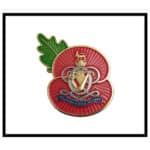Lt Col Decimus Pope died in hospital after a few weeks’ illnesses on 23rd December 1963, shortly before his seventy-fourth birthday.
He joined the 8th Hussars in September 1910, and served with distinction in the First World War, being awarded the M.C.
His service with the Regiment embraced two tours of duty in India; active service in Iraq; with the Army of Occupation in Germany, and two tours in Egypt.
He commanded the Regiment from 1932 until retirement in 1936 having seen them through several difficult periods both as second-in-command and as Commanding Officer. During this time he was largely responsible for the successful switch over from horses to mechanisation.
A born leader, a great personality and an outstanding C.O. Decimus was a brilliant tactician and were probably the only cavalry Commander ever to force the Brigade of Guards to withdraw during manoeuvres. On another occasion, by a stroke of genius, he managed to terminate in 48 hours manoeuvres which had been planned to last almost a week.
As an organiser, he was also outstanding. The Old Comrades’ reunion which he staged at Aldershot was a most memorable event at which the attendance was phenomenal and almost every surviving officer was present.
One of his greatest gifts was the ability to choose the right person for the right job and, having done so, always gave them the “run of their teeth.”
He raised the Regiment to a very high standard of military efficiency and to great successes in the field of sport. Having completely re-organised the Regimental polo, he instilled such enthusiasm for the game that when the move was made to Egypt in 1932, every officer owned ponies. In a very short time, the 8th Hussars showed that they were at the very top of the polo in Cairo by their numerous successes in all the big tournaments.
“Decie” was recalled for service in the Second World War and went to France. When the British Forces were evacuated in 1940 he was on board the Lancastria which was dive-bombed and sunk in the Channel.
Later he served on the Officers’ Selection Board until the end of hostilities.
After his retirement, he was co-opted to assist in the amalgamation of the 4th and 8th Hussars, when his tact and judgment contributed in no small degree to the successful and happy achievement of this delicate operation.
His interest in the Regiment did not terminate with the end of his service and up till the time of his death, he was a valued member of Regimental committees. A fine shot and an expert fisherman, dry fly artist in his younger days, he later turned to tunny fishing, and eventually fished for salmon only. He was a member of the M.C.C. and always retained a keen interest in cricket.
Finally retiring from Army life, he went to live in Somerset where he concentrated on still another abiding interest—the growing of roses. Having been elected a member of the Council of the National Rose Society, he served on several of their committees and became a widely known authority and judge. This hobby gave him great contentment in his last years.
Quiet and unassuming, with an immense sense of humour, “Decie” was a wonderful companion and a true and loyal friend.
Perhaps the secret of his charm was that he always remained young at heart, and his countless friends were of all ages and kinds.



